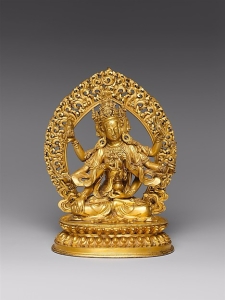BY BUDDHISM NOW on 8 APRIL 2017
 As westerners most of us have come to Buddhism of our own accord. We were never pressed into it by our culture, society or, usually anyway, by our families. On the contrary, our culture and families can be quite hostile towards a religion like Buddhism. Some people seem to get round this by saying they aren’t ‘Buddhist’ as such because they don’t go in for labels; they’re simply interested in Buddhism as they are in many other things, ‘After all, Buddhism isn’t really a religion, is it? It’s more a way of Life.’
As westerners most of us have come to Buddhism of our own accord. We were never pressed into it by our culture, society or, usually anyway, by our families. On the contrary, our culture and families can be quite hostile towards a religion like Buddhism. Some people seem to get round this by saying they aren’t ‘Buddhist’ as such because they don’t go in for labels; they’re simply interested in Buddhism as they are in many other things, ‘After all, Buddhism isn’t really a religion, is it? It’s more a way of Life.’
The excuses come out and maybe we ease feelings of disloyalty towards ‘our’ group and also ward off any whispers or criticisms from our friends. That look of horror that can sweep across someone’s face when you tell them what you are doing with your life can be quite off-putting; it sort of says, ‘Are you feeling all right? Have you lost it a bit?’
Things are much better than fifty years ago. It was definitely ‘foolish‘ or ‘traitorous’ even to be showing signs of being that interested in eastern religions. For myself there was never any problem in the family. My mother took as much interest in Buddhism as I did and my father didn’t much care. But I learnt not to say too much to my friends. A few stares of disbelief and awkward silences was enough for me, if I ever had the temerity to mention my heartfelt interest. So I lived with a private kind of Buddhism while in other respects living a typical working-class English life in a city in the late fifties and sixties.
Things are much different now, of course, but still the seriously practising western Buddhist is in the minority, especially if your interest goes beyond the academic level, or if you actually investigate the Buddha’s teachings in ordinary life. Then things start to change and people start to notice that you are not quite the same any more, the things you once enjoyed are much less attractive now and your basic values have started to change.
 The deeper we get into the dharma, there is no doubt our lives can change in a most dramatic way; slowly to begin with but then more and more — which of course is the whole point of practising Buddhism in the first place. If our values remain the same and our habits and tendencies remain the same, would there be any point in the practice? The Buddha, I’m sure, would not have thought that was good value for a so-called Buddhist life.
The deeper we get into the dharma, there is no doubt our lives can change in a most dramatic way; slowly to begin with but then more and more — which of course is the whole point of practising Buddhism in the first place. If our values remain the same and our habits and tendencies remain the same, would there be any point in the practice? The Buddha, I’m sure, would not have thought that was good value for a so-called Buddhist life.
Having survived other people’s prejudices, we can then, over the years, fall into the trap of thinking we’re doing okay by following certain traditions and forms of sitting. But form will always remain as form. Just taking on a particular regime is not going to bring insight and understanding into suffering and the nature of existence. The sense of unsatisfactoriness and suffering might continue even within the framework of a Buddhist life. And as the Buddha’s teaching is based on the four noble truths — the truth of suffering, the truth of release from suffering, the truth of the cessation of suffering, and the path which is the cessation of suffering — if we’re still as unhappy and confused at the end of many years of Buddhist practice as we were at the beginning, then maybe we should ask ourselves whether we’re doing it right after all.
Geshe Lobsang Thinley mentioned several times during a recent retreat held at the Golden Buddha Centre that the point is for the mind to change. All the forms, all the outward practices, will remain at the level of mere form, unless an inner change takes place.
Many of us have gone to the trouble of coming away in many respects from our childhood conditioning in order to pursue something we perceived as more real to us. Having got that far it’s a pity if we waste all that initial enthusiasm and find that we have merely replaced one form of conditioning with another. It’s always worth checking it out. Have our minds changed? Not: Have we changed our minds? i.e. replaced one set of views and opinions for another, but is the mind genuinely turned towards wisdom, compassion and freedom from suffering?
First published in the November 2006 Buddhism Now
No comments:
Post a Comment